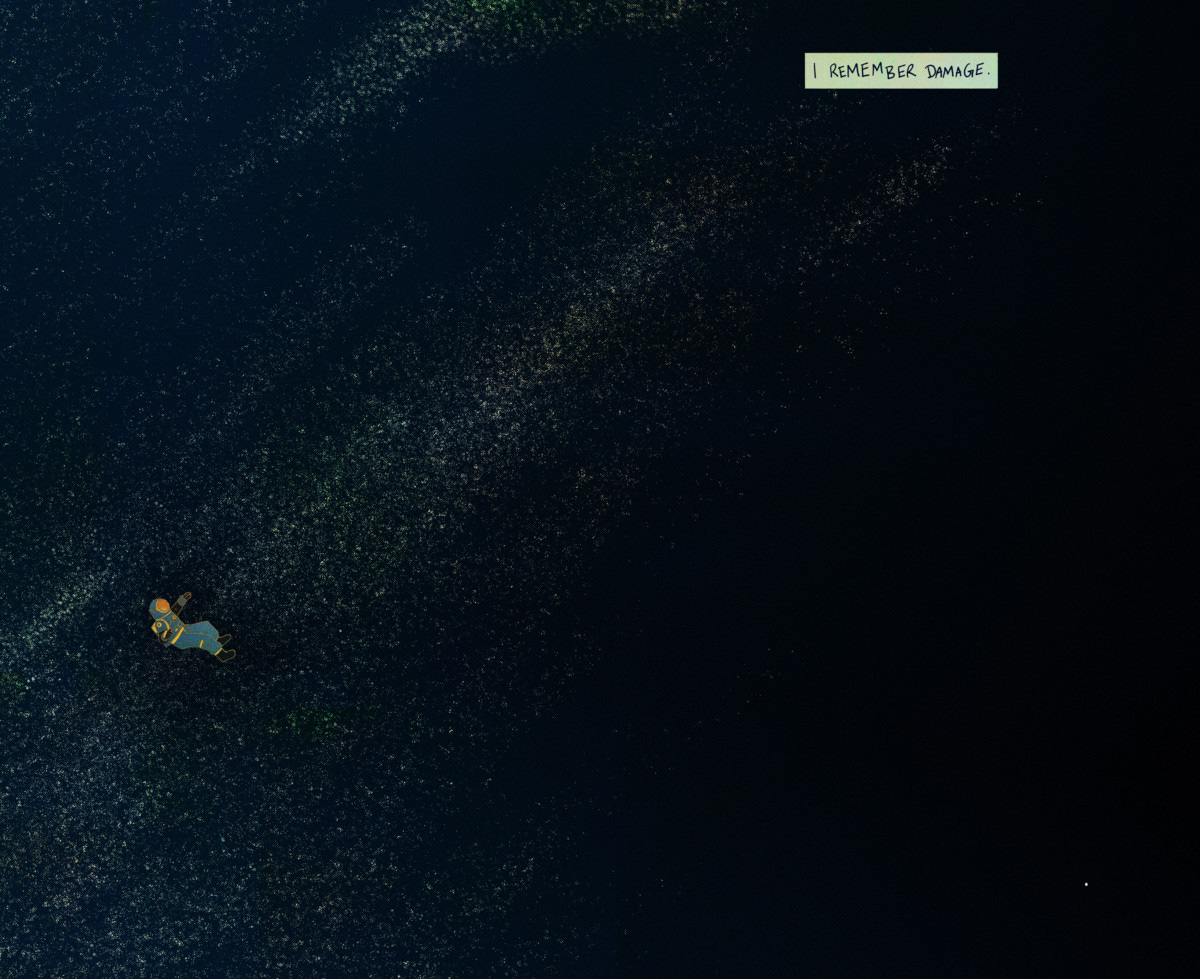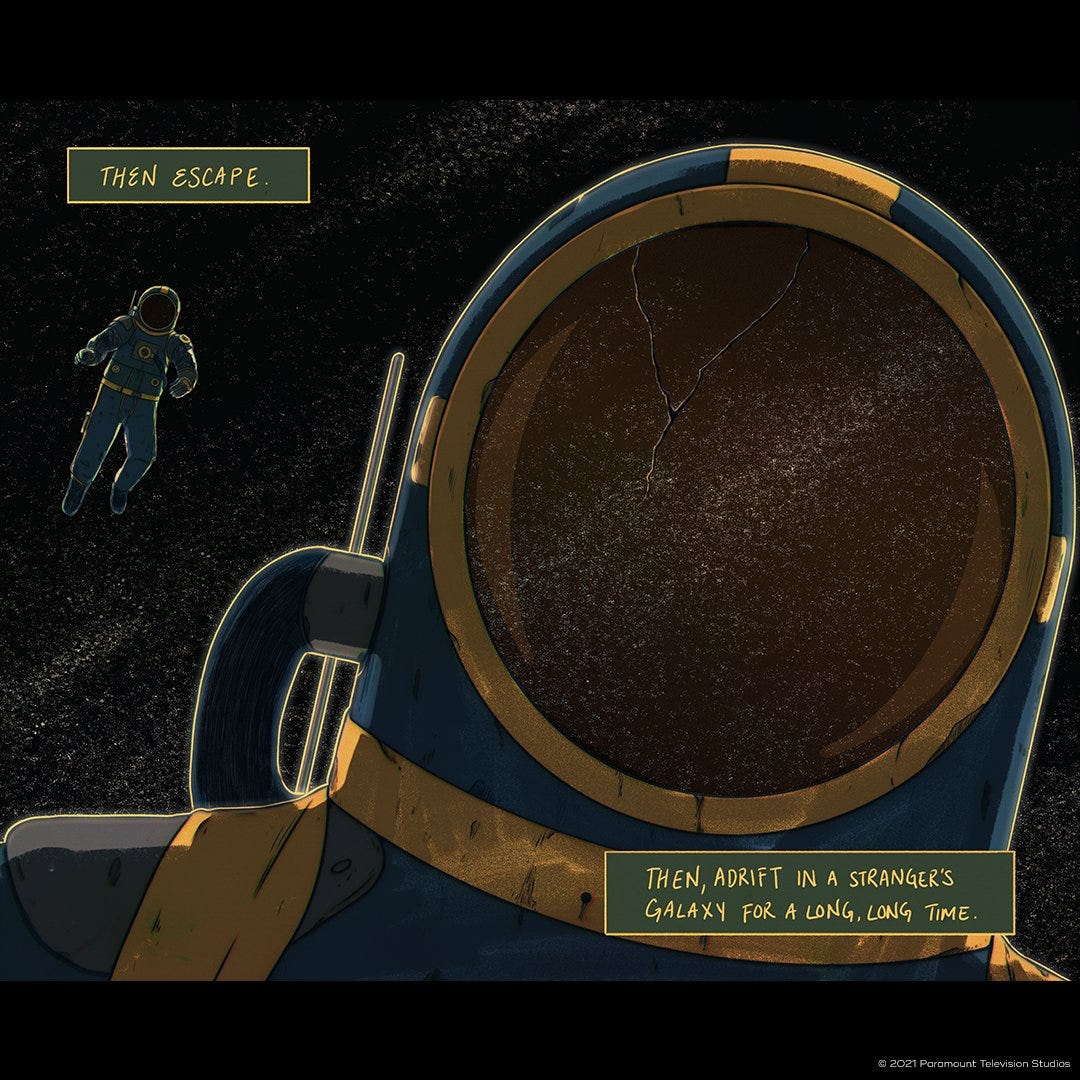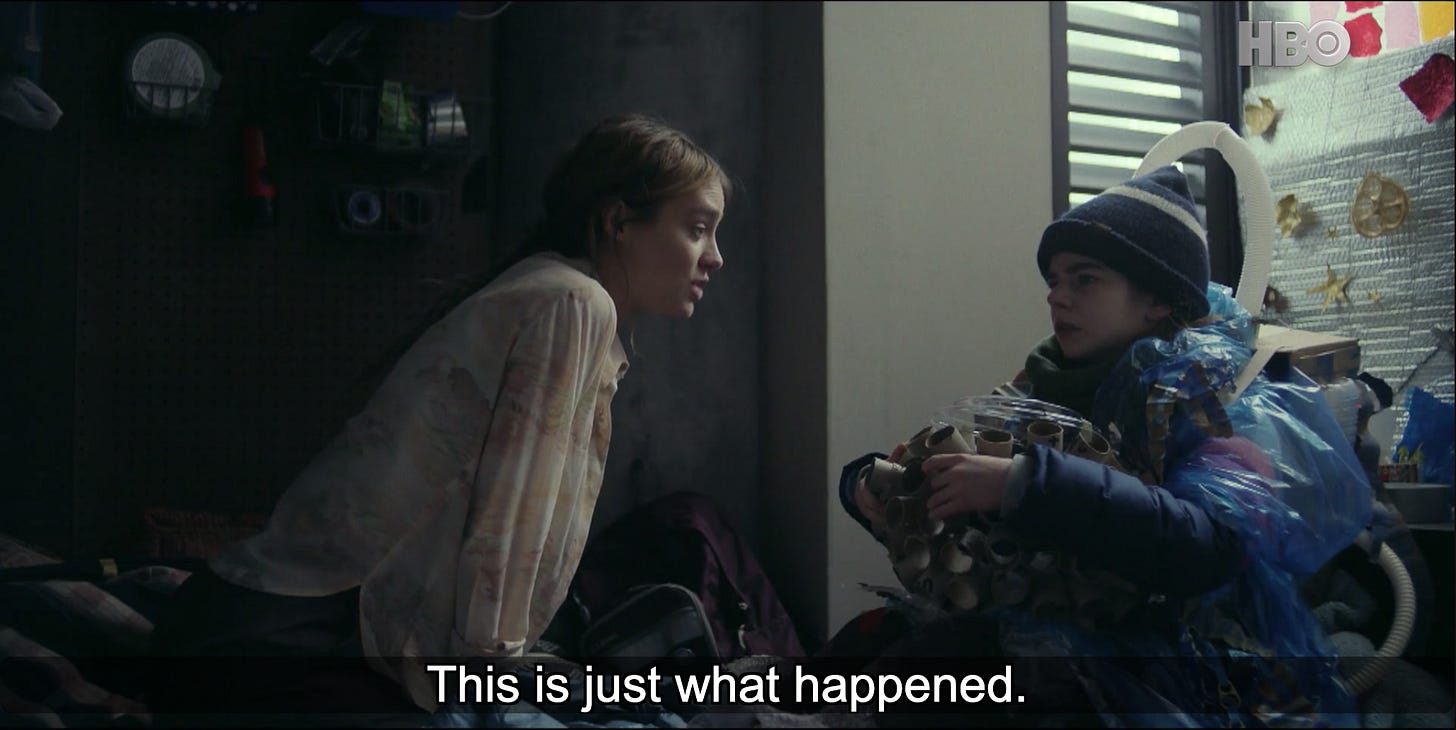"black bile, immobile, headworm"*
went a little dark this month as I traverse into the deep realms of seasonal depression creeping annually into this no seasons tropics, traumanniversaries and stringy coping mechanisms.
(Title taken from an old favourite, Headworm by The Observatory. The song is such a mood fitting to this piece)
(CW: ideation, depression, trauma. Also containing spoilers from the amazing HBO series Station Eleven)
(i) “I remember damage”
Every year, at the end of September and the start of October, it arrives quietly without making an entrance or a scene. Little things first. Long lucid dreams. Issues with the gut and bone dry fatigue. An emptying out as if all my familiar habits (and the emotions tied to them) have packed their bags and gone into hibernation. These little things are the easier bits; I used to believe that they are warning signs for me to take it easy or go a little harder. Fake it till you make it as I force my way through. You are brave ila, a pronounced lie carried in my heart, for so many years that the lie forms into habits of looking away, avoiding, pretending that’s all is good. I was never brave, in fact I was terrified. But I kept running in the other direction, kept going, believing that it will soon disappear.
Then the hard part begins, Long lucid dreams start spilling out into real life. A trigger here, a trigger there and suddenly I am in water, some darkness, caught in an undertow. Emotions I have no words for but I have known all my life. Losing track of time, of dates, finding it hard to fall asleep, even harder to get out of bed. It is unforgiving, ruthless and out to destroy everything inside me. It’s here, a pestilence, that dredges up the past in its net, bringing it all up to the surface. I find myself in the middle of a memory, innocuous at first, sitting beside my father, in his company’s van. In my hand, old paper parking coupons. He is showing me a trick to to peel the punched-out holes. This way you can use them again for another day. I made a mistake on one. He smiled and assured me, it’s ok, just watch. His forehead is shiny from the streetlight, Everything is vivid and bright, I can feel the worn out seats on my skin, warmth, a yearning.
The pestilence does a trick too, and turns the memory rotten. Same van, same father. Different night, I was slightly older and he was not smiling. This time we are on top of Jurong Hill. He is asking me about my mother and her friend, about the three of us having dinner at that Japanese restaurant. How can you not tell me? He was screaming as he hit his hand on the steering wheel. I was only thirteen. It was her secret, not mine. I was scared for my life. Everything is still vivid and bright, although I have buried this memory deep inside me, a long time ago. This time I am not allowed to look away. I am crossing the street. I am pushing the pram. My child looks up trying to get my attention. She giggles when I make funny faces. My insides are burning but I do not stop. Her laughter hurts. This happens again and again throughout the day. My head is noisy, I tell my partner. There is nothing you can do about it. It will pass.
A few months back, I binged on HBO’s one-off series Station Eleven, adapted from a book (with the same title) written by Canadian writer Emily St John Mandel. The series jumps back and forth time and across the narratives of multiple protagonists, whose lives became entwined at different points and coalesced during a pandemic that wiped 99% of the world’s population. Unlike the book (which I binged on too right after the series), the anchor and tone for the entire series is based on a meta-narrative graphic novel of the same name, created by one of the five protagonists, Miranda Caroll. In the graphic novel, wonderfully illustrated by Maria Nguyen, there is a line that becomes a sort of mantra for all the characters.
“I remember damage. Then escape. Then adrift in a stranger's galaxy for a long, long time. But I'm safe now.”
Those lines becomes my mantra too, words I have been looking for all these years. This time around I do not look away. These words spread out across the net, small sharp knives glowing bright. The net comes apart. The pestilence is weakened. Everything is a mess but this time, I allow myself to look.
These can manifest in many ways, for others. Something I call traumanniversaries. The body remembers, through these cellular memories. This can be triggered by smells, sounds, objects or even the dates in which events occured. Here’s a little slice of what it may feel like:
There are plenty of ways one can ready themselves for a traumanniversary. A kind of reclamation to the incident. I have not really figure out how in all honesty, some hits and mostly misses. Therapy in the last two years have sort of helped equipped me with plenty of resources. But no matter how much I prepare, the paralysing aftermath from these seemingly random surfacing are pretty detrimental. Healing is hard work guys, and hella lonely and fucking exhausting. One that requires some kind of consistency in the work of diving in, of pulling apart, and breaking down, rearranging. A remaking of sorts, authored by your lonesome </3 self.
Hard questions, like dead weights attached themselves to each memory, causing time to fold violently, my past into my present into my past, always with no satisfying resolve, no closure. Being a parent myself now, it becomes even more difficult to understand my parents’ actions in those years where I was still under their care, years in which I was abandoned and blamed for their divorce. Trauma manifests and repeats in other ways.
(ii) Vanishing Humour: The curious case of melancholia and other crummy bits of the unseen.
In one of the chapters of The Emperor of Maladies, Siddharta Mukherjee’s deep analysis on the history of cancer, the writer shares the etymology of the medieval term for depression:
Indeed, melancholia, the medieval name for "depression," would draw its name from the Greek melas, "black," and khole, "bile." Depression and cancer, the psychic and physical diseases of black bile, were thus intrinsically intertwined.) Galen proposed that cancer was "trapped" black bile--static bile unable to escape from a site and thus congealed into a matted mass. "Of blacke cholor [bile], without boyling cometh cancer,"
Claudius Galen was a physician, prolific writer and an influential Greek doctor who practiced among the Romans around AD 160. Using Hippocrates proposition of the four cardinal humours, fluids in the body which consisted of blood, black bile, yellow bile and phlegm and how an excess of one fluid may cause illnesses to occur in the body, Galen believed that depression of the mind led to the excess of black bile in the body causing cancers to form. “You could cut cancer out, but the bile would flow right back, like sap seeping through the limbs of a tree” Galen concluded and thus was best to leave the tumours alone.
Of course, this theory was made during a time in history when the seeds of technological advancements in medicine that we know of today have not even been planted. So yeah Galen was pretty way off. Many thousands years later, a nineteen year old Andreas Vesalius, arrived at the University of Paris to start a practice in surgery by learning, yeah you guess it, Galenic anatomy and pathology. He was a real life Dr Frankenstein of sorts, raiding graveyards around Paris for bones and bodies, smuggling them to his dissection chambers to create intricate illustrations of veins, arteries, lymph nodes, a detailed cartography of the human body. Ironically, in search of the elusive black bile.
“But no matter how diligently Vesalius pored through the body, he could not find Galen's black bile. The word autopsy comes from the Greek "to see for oneself"; as Vesalius learned to see for himself, he could no longer force Galen's mystical visions to fit his own. The lymphatic system carried a pale, watery fluid; the blood vessels were filled, as expected, with blood. Yellow bile was in the liver. But black bile--Galen's oozing carrier of cancer and depression--could not be found anywhere.”
I apologised for the clumsy sidetrack into this, (at least for me) massive and important discovery in the realms of medicine. As I mapped out my own depression towards its origins, dissecting myself almost in the same ways that Vesalius have done to countless cadavers, I find the absence of the black bile metaphorical to my own search. Here’s the thing, Galen did get it right somewhat. There are countless research that have been done to connect certain forms of cancer, such as pancreatic or lung, to mental illnesses specifically, major depressive disorder. Excuse the med-speak but here’s one of them:
So what does this got to do with anything? Well, chronic stress may occur in folks who are trapped in their survival mode (of flight, fight, freeze and fawn) for a pretty long time and have no awareness of it. Sis be living, and surviving all these shit that just keeps popping up. And so the body essentially retains the trauma to avoid more trauma, causing stress and other messes. There seems to be no escape. Not in this classic patterns of survival, both trauma informed and trauma response, feeding off each other. At first I thought if I trace it back to the root and pull it out from there it will stop growing y’know, but much that melancholic black bile it’s hard to trace something that does not show itself.
Therapy seem to work in small ways, but I became unrecognisable, adrift in a stranger’s galaxy for a long long time. First session was crying to an armchair pretending it was my father. Cathartic in that moment but not in the weeks that followed. I was on Lexapro for about two months, an SSRI, meds to give my damaged serotonin a little boost. That was fun. I felt like I was micro-dosing dusty old Mollies, my limbs were jelly and I had a mini Sahara desert in my mouth. Takes a while before it works properly. Give it another month. By the third, I was more of a mess than before I started. I had to stop the meds. It was not all bleak though, my first therapist, bless her soul, told me to be curious of all these feelings. To stay curious. Not in as I walk through the valley of the shadow of death curious, but like wide-eyed, inquisitive, pressing your face against the glass of your arcane subconscious curious.
Some stuff seem to stick longer than others. Keep looking for it, find out what it means. Get to know yourself again. It’s ok to break down. Be kind to yourself. I was always that fourteen year old who was scared for her life every single day, or the 17 year old who lived recklessly because she just wanted to unalive herself or all those years in my twenties faking this put-together high functioning fun and manic out for a good time version always smiling, always laughing, barely alive behind closed doors.
And then there’s that classic shizzle of being there for everybody but myself to make sense of my own feelings of abandonment all these years, that shit got to go hun to make time, to make space. And the time I made opened all the doors and the closets and I space allowed me to hold these skeletons close to me. I can (and I will) lose my shit. I can finally be curious about why I am losing my shit. I can be sad and angry and all the feelings I could not allow myself to have because I might not survive if I did. “Survival is insufficient.”
Finally escape seems to be plausible after realising I’ve been looking at it all wrong. The escape goes deeper in and not outside of it all. And slowly I start to see the unseen, that black bile, the pestilence, the seasonal depression that comes so readily to fuck things up. But no, not with that clarity of some fail-safe solution that makes the depression goes away for good. I am not out to seek and destroy. I am not pulling it out of me. Instead, by seeing all this shit and acknowledging it, I figure out (slowly and painfully) what I need to give myself and what I need from others around me to get through this, through the day at least. I start looking at my child self not as a wounded being that needs to be saved, but as the self that has saved me all these years, over and over again.
(iii) “I have found you nine times before, maybe 10, and I’ll find you again.”
Sometime mid last year, a dear friend and I spend a nice late afternoon sitting by the reservoir in the middle of nowhere. It was my first akashic reading, a kind of desperation from being ill physically and spiritually. My depression period overstayed longer than March, having gone through a traumatic encounter and finding trouble finding my footing from its rippling damage. I closed my eyes, the ground was cool grass and wet earth and the sun was beginning to set. I prepared three questions (which I cannot seem to recall in this moment) and my friend started the reading. The space itself became alive, sounds of birds and trees resonating with energies, ancient energies.
Here’s a little write up and where you can find a little bit more about it:
“Why understand the past?
We are a result of our past. Understanding dynamics of the past can help see the trajectory of our soul's journey from a cosmic perspective across lifetimes, understand and accept challenging events and people, and heal from the trauma that all souls go through. Reclaiming power and energy left in the past (dimensions, lives, situations, people, places etc., ranging from many lifetimes ago to yesterday) can help us be present in the now, to create liberated futures. The querent is conveyed messages that they are ready to receive for their highest good.”
What I loved about this reading were these rich imageries my friend described, my mother and I eating buns maybe in this life, maybe in another. A past life of me as some botanist, a hooded figure with bottles of remedies in my tower, isolated from a society that marked me as a deviant. When asking about anger and my lack of control, my friend described a circular and metallic obstruction in my gut. You need to break it apart and release it to other parts of your body she said. My pain has always accumulated in my gut, manifested as gallstones, gastric or bad gas. I let out a fart mid-read and then a laugh.
This first reading was the start of the seeing, that going deeper. It saved my life. The depression tapered down a bit but returned in the beginning of this year, worst than ever. My head was noise at every moment. Trigger, recall, breakdown, repeat. I went for long walks on my own, sometimes at 5am. I brought my camera out. I went into the forest, sometimes going off route, with friends or on my own. There were laze days, picnics with the three of us on Sundays, lunch dates with my child, sleeping in. And then they were haze days, head filled with noise. I overworked, overcompensated. Trigger, recall, breakdown, repeat. Hits and misses.
I had my second reading in February this year, this time remotely. My dear friend made time to call in. I was on my sofa. Eyes closed. I could feel the light moving in and out of the windows. Give thanks to these experiences, you are here because of all the good and the bad. You are here. Let them flow out of your fingers and toes. Give thanks to them and let them leave you. I feel myself loosening up, the little knots unravelling. The vivid memories grow less and less, I give my thanks at every moment and release them bit by bit. On days where I have the energy, I share them with my partner, or a friend. I write and read a lot. I kept going for long walks, I go for runs, I cycle every Sunday with my family. New memories grow more and more. I give my thanks at every moment and let them in.
In episode #7 of Station Eleven, adult Kirsten woke up among dead bodies after an ambush. She had been poisoned by one of the attackers. Her child self shows up. They are dressed the same. Seeing her child self, adult Kirsten remarked, you found me again. Much later in the episode, an altercation occured in a flashback scene of the house that child Kirsten was staying at during the start of the pandemic, resulting in the death of one of her two guardians. Adult Kirsten stood breath heavy, her face wet with tears, witnessing what had occured probably for the first time, as her child self hid in the bathroom, terrified.
Here, adult Kirsten is kneeling in front of her child self, assuring her that things will be ok
Child Kirsten: We shouldn’t have done the play
Adult Kirsten: This didn’t happen because you did the play. This isn’t your fault. This is just what happened.
I love this episode because reparenting goes both ways. The child, the adult, again and again. We revisit these painful memories and try to forgive ourselves, tell ourselves it was never our fault. That this was just what happened. Child Kirsten with her antidote, adult Kirsten with her words, all permutations of past-and-present folding in and out, “I have found you nine times before, maybe ten. And I’ll find you again.”
My child self triumphs and carries me through the darkest of days, more times than I can remember. I find her during my walks, in my loud laughter, when I dance, I find her all around me, reverberating inside me, outside of myself, in the tender words of my closest, in awkward hugs, in my puddle messes. I find her, always, first and foremost, when I start to forget who I am again.
(iv): all the small things
So here’s to the small things that have helped me (and this is not in anyway supposed to be prescriptive to anyone else reading this):
Celebrate the tiny wins. Getting out of bed, taking a shower, that one little task that have been put on hold. These are still big steps though they may feel so little.
It’s ok to be angry. It’s alright to be happy. And it’s alright to be honest about all these feelings. Find ways to talk about the emotions that are the hardest, even the good ones. And there is no need to be articulate about it either.
Begin your own little rituals of healing. My akashic sessions have helped me tremendously. And with the same friend, we did a burning ritual last month where I burnt the only non-candid photo of my family as I wish for my own broken family members’ journeys towards forgiveness and healing. Make your own little set of rituals, plan it with others.
If it doesn’t go away, it is not my fault. Let it stay a bit longer, it’s alright.
Hurt people, hurt people but hurt people are deserving of love too. My relationships have always been fraught in these last few years because hurt people hurt people and I am in the process of unlearning so much. Getting that help from others whom I’ve trust and have been so generous in their ways have made me realised the kinds of friendships and familial relationships I wish to nurture.
Break old patterns and habits, form new patterns and habits. This is by far the hardest homework and I am still working hard on this one, every bloody day.
Keep track of the hits, and be curious about the misses. Getting to know myself again is pretty fun tbh.
Healing can be playful if I allow it to be.
Getting to know my body has been so crucial, even in moments where I disassociate, experiencing dysmorphia, physically unwell or when my head is noisy.
Triggers are valid signposts to guide me towards my needs and desires. Keeping track of them, even the dates of the occurrences, gives these sudden shifts tangible shapes and characteristics. It helps to name them, be present in them, send them off when they are ready to leave, welcome them when they arrive.
Revisiting stuff consciously that may trigger episodes, in my own right and in my own ways, have helped. (Last week, I played at the drive in and sang it out loud as I cycled home crying). Sharing core memories with others, even the yucky ones, gives me a sense of grounding.
And that’s that for now I guess. Sending love and tenderness to all of you struggling as well. May we all slowly find ourselves again and again. <3












